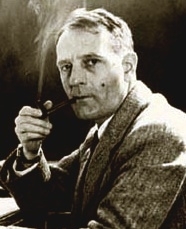Hubble, Edwin (People)
Hubble, Edwin
Edwin Hubble (1889-1953), an American astronomer widely regarded as the most influential astronomer since the times of Galileo, Kepler, and Newton. He is also regarded as the founder of the field of cosmology. He made four seminal contributions: (1) he proposed a new classification system for nebulae (1922-1926); (2) he determined that the distribution of galaxies, averaged over many solid angles, was homogeneous in distance (1922-1936); (3) he settled decisively the question of the nature of the galaxies (1924); and (4) he developed the notion of the expanding universe (1929) that is the core of cosmological science today. His discovery of the expanding universe was based on the observation that light emitted by distant galaxies is shifted to longer wavelengths when compared to the spectrum of closer galaxies. This phenomenon became known as the red shift and is due to the Doppler effect.
Further Reading
Hubble Biography (University of St. Andrews, Scotland, School of Mathematics and Statistics)
NASA's Hubble Space Telescope (National Aeronautics and Space Administration)
People and Discoveries: Edwin Hubble (PBS Online)
Time 100: Edwin Hubble (TIME Magazine Online)
